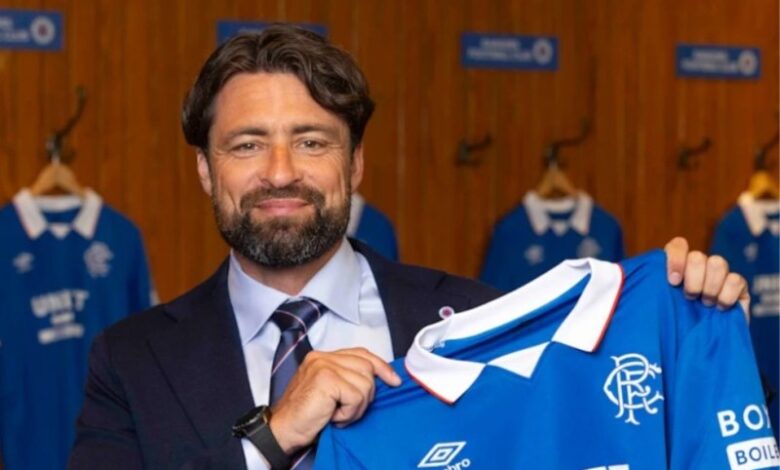Russell Martin: From Footballer to Visionary Manager and Entrepreneur

Russell Martin’s journey through football and beyond is a compelling story of perseverance, leadership, and innovation. Born in Brighton, England, on January 4, 1986, Martin has established himself as an influential figure in the UK football scene—both on and off the pitch. Today, he is known not only for his managerial roles, including at Rangers Football Club, but also for his charitable work, entrepreneurial ventures, and personal life, which has garnered considerable media attention. This article explores the multifaceted life of Russell Martin, highlighting his football career, educational background, business initiatives, and personal relationships.
Early Life and Education
Russell Martin grew up in Brighton, where his passion for football began at a young age. He attended Varndean School from 1997 to 2002, where he balanced academics and sport. Beyond his early schooling, Martin pursued extensive formal education in football management, earning key certifications that helped transition him from player to coach.
Between 2015 and 2020, Martin completed a series of UEFA coaching qualifications, including the UEFA B License (2015–2016), UEFA A License (2016–2017), and the prestigious UEFA Pro License (2018–2020). Alongside this, he earned a Diploma in Football Management from the League Managers Association between 2018 and 2019. These credentials underpinned his understanding of football tactics, leadership, and team management—skills that have defined his managerial career.
Playing Career: Building Foundations
Martin began his professional playing career at Wycombe Wanderers in 2004 after starting at Lewes. His consistent performances earned him a transfer to Peterborough United in 2008. However, it was his move to Norwich City in 2009 that marked a defining period. Over nearly nine years at Norwich, Martin made close to 300 appearances and captained the side through two promotions to the Premier League.
Towards the end of his playing career, Martin had brief spells at Rangers FC, Walsall, and Milton Keynes Dons, retiring as a player in late 2019. During his playing days, he wore the number 33 jersey as a defender, known for his leadership on the pitch.
Transition to Management: A New Chapter
Following his retirement from professional football, Russell Martin quickly transitioned into coaching and management. His first managerial role was with Milton Keynes Dons (MK Dons) in January 2019, where he impressed with a possession-based style that emphasised tactical discipline and ball retention. Under his guidance, MK Dons became known for their attractive football and record-breaking team goals.
In August 2021, Martin accepted the role of head coach at Swansea City Football Club, competing in the English Championship. Over two seasons, he led Swansea to a solid mid-table finish, earning praise for developing young talent and promoting an attacking philosophy.
In June 2023, Martin’s managerial reputation earned him the head coach position at Southampton Football Club, a club with a rich history in the Premier League. He led Southampton to promotion back to the Premier League through the Championship play-offs in May 2024. Despite a challenging start in the Premier League, which culminated in his dismissal in December 2024, Martin’s impact was clear: a fresh, modern approach to management grounded in possession football.
Russell Martin at Rangers Football Club
June 2025 marked a significant milestone as Martin was appointed head coach of Rangers Football Club in Glasgow on a three-year contract. Rangers, one of Scotland’s most storied clubs, sought Martin’s leadership to rejuvenate their playing style and competitive edge. Known for his modern football philosophy and focus on player development, Martin’s role at Rangers is viewed as a pivotal step in his managerial career.
His tenure at Rangers has already sparked enthusiasm among fans who appreciate his commitment to an attacking, possession-oriented approach combined with resilience and tactical discipline.
The Russell Martin Foundation: Giving Back Through Sport and Education
Beyond football, Martin has demonstrated a commitment to social impact. In 2016, he founded the Russell Martin Foundation, a registered charity aimed at positively influencing children and young people through sport and education. The foundation’s mission is to provide opportunities and resources that empower youth to develop both athletically and academically.
This charitable endeavour reflects Martin’s belief in the transformative power of sport as a tool for social good and personal development, drawing from his own experiences growing up in Brighton.
Entrepreneurial Ventures: Cryobright and Erpingham House
Russell Martin’s interests extend into the health and wellness sector. Since June 2021, he has been a co-owner of Cryobright, Sussex’s first cryotherapy and modern wellness clinic. Cryobright offers services like whole-body and localized cryotherapy, aimed at accelerating recovery, enhancing performance, and promoting overall well-being through cutting-edge, science-backed therapies.
In addition, Martin co-owned Erpingham House, Britain’s largest plant-based restaurant located in Norwich, Norfolk, with a second location opened in Brighton in 2020. This venture aligns with Martin’s personal lifestyle choices, including his long-standing commitment to veganism since 2014 for health reasons.
Personal Life: Relationships and Public Profile
Russell Martin’s personal life has attracted media interest, particularly his relationships. He was married to Jasmine Martin from 2013 until their separation in 2023. The couple has one son, Reno Martin.
Following his separation, Martin’s relationship with British actress and model Lucy Pinder became public. Known for her work in men’s magazines, Lucy Pinder has been seen supporting Martin, especially since his appointment at Rangers. The couple’s relationship highlights Martin’s more private, grounded nature away from the limelight.
Legacy and Impact
Russell Martin’s journey from a young footballer in Brighton to a respected manager and entrepreneur illustrates his resilience and versatility. His commitment to education, coaching excellence, charitable work, and business ventures reveals a multi-dimensional personality rarely seen in professional sports.
At Rangers, he is poised to make a significant mark on Scottish football, applying his philosophy of intelligent, possession-based football while fostering youth development. Meanwhile, his off-pitch efforts through the Russell Martin Foundation and his business interests in wellness and plant-based nutrition contribute to a holistic approach to life beyond sport.
Conclusion
Russell Martin embodies the modern football professional who blends athletic expertise, academic achievement, and social responsibility. From his playing days at Norwich City to his current role at Rangers, Martin’s career is marked by leadership and innovation. His personal life and ventures reflect his values of health, community, and well-being.
As he continues to evolve as a coach and businessman, Russell Martin’s influence extends well beyond football, positioning him as a role model for aspiring athletes, coaches, and entrepreneurs across the UK and beyond.



